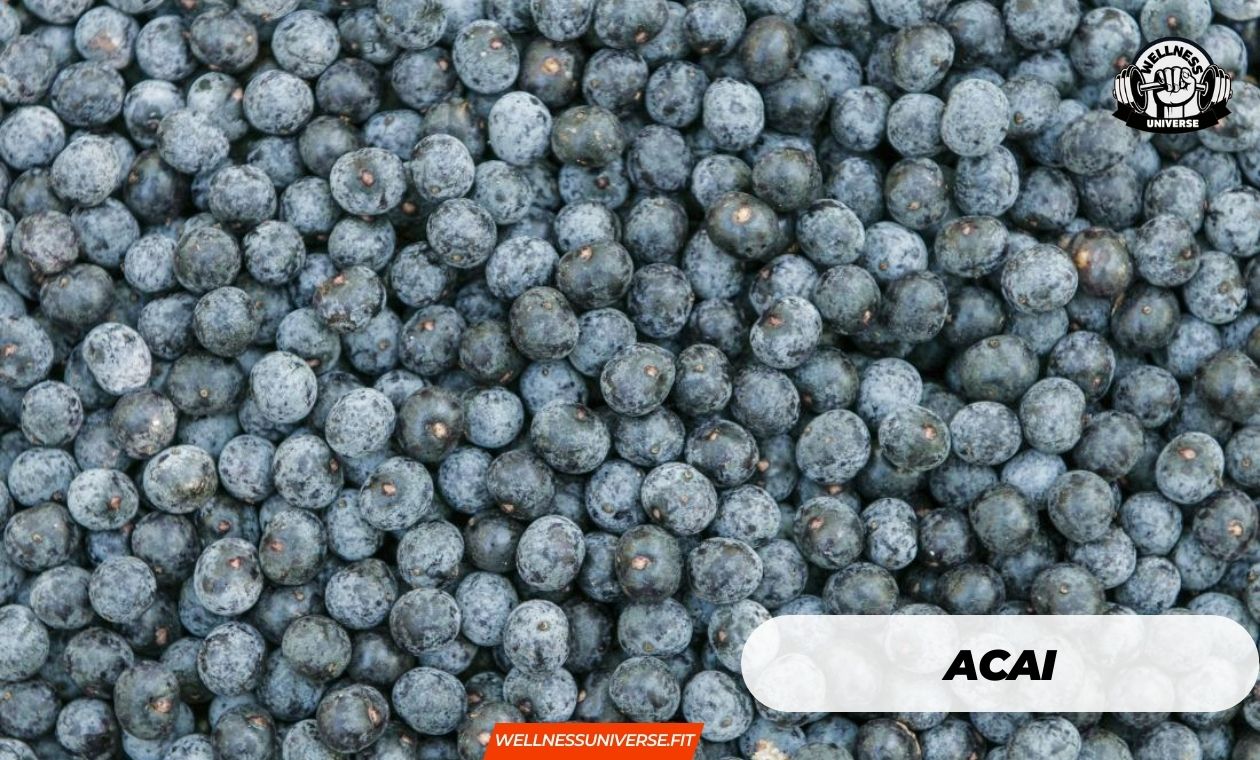Acai (pronounced ah-sigh-EE) is a small, dark purple berry that grows on the acai palm tree, scientifically known as Euterpe oleracea. It is native to the Amazon rainforest in Brazil and has gained immense popularity worldwide due to its numerous health benefits and unique nutritional profile. The acai berry is about the size of a grape and is known for its rich color and deep flavor, often described as a combination of berries and chocolate. It is highly regarded for its potential to promote overall health and well-being.
Acai berries have been a staple food for the indigenous people of the Amazon for centuries. The acai palm tree grows abundantly in the swampy areas of the Amazon rainforest, primarily in Brazil. The fruit has been an integral part of the local culture and diet, providing sustenance and nourishment for generations. In recent years, acai has gained global attention, and its cultivation has expanded to other regions with suitable climatic conditions, including parts of Central and South America.
In the Amazon region, acai holds great cultural significance and plays a central role in traditional ceremonies, rituals, and everyday life. The indigenous tribes have long recognized the exceptional nutritional value of acai berries and have utilized them in various ways. The berries are traditionally harvested by climbing the tall acai palm trees and manually collecting the clusters of fruits. They are then processed by removing the pulp and seeds, which form the main edible part of the fruit.
The Indigenous people have incorporated acai into their diets, consuming it in different forms such as juices, smoothies, and porridge. Acai has also been used medicinally for its potential healing properties, as well as in the production of natural dyes for textiles and body painting. The cultural importance and traditional knowledge surrounding acai have been passed down through generations, and the fruit continues to hold a special place in the lives of the local communities.
Today, acai has transcended its cultural boundaries and has become a global sensation. Its popularity has soared due to its remarkable nutritional value and health benefits, leading to the widespread consumption and commercialization of acai-based products. From smoothie bowls to energy drinks, acai has found its way into the mainstream market, capturing the interest of health-conscious individuals seeking a natural and nutrient-dense superfood.
Nutritional Profile of Acai

Acai berries are often hailed as a nutritional powerhouse due to their impressive array of essential nutrients. While small in size, these berries pack a punch when it comes to their nutritional content. Acai berries are low in sugar and are primarily composed of beneficial fats, dietary fiber, and a variety of vitamins and minerals. Let’s explore the key components that contribute to the nutritional value of acai:
- Macronutrients: Acai berries contain a balanced combination of macronutrients. They are a rich source of healthy fats, particularly monounsaturated fats, which contribute to heart health and help maintain a healthy lipid profile. They also provide a moderate amount of dietary fiber, which aids in digestion, promotes satiety, and supports overall gut health.
- Vitamins: Acai berries are abundant in several essential vitamins. They are particularly high in vitamin C, an antioxidant that plays a vital role in immune function, collagen synthesis, and the protection of cells against oxidative stress. Acai also contains significant amounts of vitamin A, which is beneficial for eye health, skin integrity, and immune function.
- Minerals: Acai berries offer a range of important minerals that are essential for various bodily functions. These include potassium, which is crucial for maintaining proper electrolyte balance and supporting heart health, as well as calcium, which is vital for strong bones and teeth. Acai also provides magnesium, phosphorus, and trace minerals such as zinc and copper.
One of the most remarkable aspects of acai berries is their exceptional antioxidant content. Antioxidants are compounds that help protect the body against free radicals, unstable molecules that can cause cellular damage and contribute to chronic diseases such as cancer and cardiovascular disorders. Acai berries are among the top antioxidant-rich fruits available, surpassing even well-known antioxidant powerhouses like blueberries and cranberries.
In addition to antioxidants, acai berries are packed with vitamins and minerals that are essential for overall health and well-being. These nutrients work synergistically to support various physiological processes, including energy metabolism, immune function, and cellular repair.
Beyond its impressive nutritional profile, acai contains a unique group of plant compounds known as phytonutrients. Phytonutrients are bioactive compounds found in plant-based foods that have been linked to numerous health benefits. Acai berries are particularly rich in several phytonutrients, including anthocyanins, proanthocyanidins, and flavonoids.
Anthocyanins, responsible for the deep purple color of acai berries, have been associated with anti-inflammatory and antioxidant properties. These compounds have the potential to help combat oxidative stress, reduce inflammation, and support cardiovascular health.
Proanthocyanidins are another group of powerful antioxidants found in acai. They have been linked to improved cognitive function, enhanced cardiovascular health, and protection against age-related cognitive decline.
Flavonoids, another class of phytonutrients present in acai, have been studied for their potential anti-cancer, anti-inflammatory, and neuroprotective effects. These compounds contribute to the overall antioxidant and anti-inflammatory activity of acai berries.
The unique combination of antioxidants, vitamins, minerals, and phytonutrients in acai berries makes them an exceptional addition to a balanced and nutritious diet, offering a range of potential health benefits.
Health Benefits of Acai
Acai berries have gained significant attention in recent years due to their potential health benefits. While research on acai is still evolving, several studies suggest that regular consumption of acai berries may offer a range of advantages for overall well-being. Let’s delve into some of the key health benefits associated with acai:
- Antioxidant Power: Acai berries are renowned for their high antioxidant content, which can help protect the body against oxidative stress. Antioxidants neutralize harmful free radicals, unstable molecules that can damage cells and contribute to chronic diseases such as cancer, cardiovascular disorders, and neurodegenerative conditions.
- Heart Health: Acai berries may have a positive impact on cardiovascular health. The antioxidants found in acai berries, such as anthocyanins and proanthocyanidins, have been associated with reducing inflammation, improving blood lipid profiles, and enhancing blood vessel function. These properties may help lower the risk of heart disease and promote a healthy cardiovascular system.
- Cognitive Function: Preliminary studies suggest that acai berries may have beneficial effects on brain health and cognitive function. The antioxidant-rich nature of acai can help combat oxidative stress in the brain, potentially reducing the risk of age-related cognitive decline and improving memory and learning abilities. Further research is needed to better understand the specific mechanisms and potential benefits of acai on brain health.
- Immune System Support: Acai berries contain various immune-supporting nutrients, including vitamin C and other antioxidants. Vitamin C plays a vital role in strengthening the immune system and supporting the body’s defense against pathogens. The immune-boosting properties of acai berries may contribute to overall immune system health and resilience.
- Digestive Health: Acai berries are a good source of dietary fiber, which is crucial for a healthy digestive system. Fiber aids in regulating bowel movements, promoting regularity, and supporting a balanced gut microbiome. Consuming acai berries as part of a well-rounded diet can contribute to a healthy digestive tract and improved gastrointestinal function.
One of the key factors contributing to the health benefits of acai berries is their potent antioxidant activity. The antioxidants present in acai, such as anthocyanins, help neutralize free radicals and reduce oxidative stress in the body. Oxidative stress occurs when there is an imbalance between the production of free radicals and the body’s ability to neutralize them. Prolonged oxidative stress can lead to cellular damage and contribute to chronic diseases such as cancer, diabetes, and cardiovascular disorders.
By scavenging and neutralizing free radicals, antioxidants in acai berries can help protect cells from oxidative damage, maintain cellular integrity, and support overall health. Regular consumption of antioxidant-rich foods like acai berries is believed to contribute to a lower risk of chronic diseases and promote longevity.
In addition to their antioxidant properties, acai berries may have specific effects on certain aspects of health:
- Cardiovascular Health: The antioxidants and beneficial fats found in acai berries may contribute to improved cardiovascular health. Anthocyanins and other antioxidants in acai berries have been linked to reducing inflammation, improving blood flow, and supporting the health of blood vessels. These effects may help lower the risk of heart disease, decrease cholesterol levels, and promote healthy blood pressure.
- Brain Function: The antioxidant-rich nature of acai berries, combined with their potential anti-inflammatory properties, may benefit brain health. Oxidative stress and inflammation are associated with age-related cognitive decline and neurodegenerative diseases. Acai berries’ ability to combat oxidative stress and reduce inflammation may contribute to better cognitive function, memory retention, and overall brain health.
- Immune System Support: Acai berries contain immune-boosting nutrients, such as vitamin C and antioxidants, which play a crucial role in supporting a robust immune system. Adequate intake of vitamin C is essential for immune cell function and the body’s ability to fight off infections and illnesses. By including acai berries in your diet, you can provide your immune system with valuable nutrients to help maintain its optimal function.
While acai berries offer promising potential health benefits, it’s important to note that they should be consumed as part of a balanced diet and healthy lifestyle. Incorporating acai berries into a diverse range of fruits, vegetables, whole grains, and lean proteins can maximize their positive effects on overall health and well-being.
Acai as a Superfood
The term “superfood” has gained popularity in recent years to describe nutrient-dense foods that offer a multitude of health benefits. Superfoods are typically rich in vitamins, minerals, antioxidants, and other beneficial compounds that support overall well-being. They are often considered to have exceptional nutritional properties and may play a role in preventing chronic diseases and promoting optimal health.
Superfoods are known for their ability to provide a high concentration of essential nutrients while being relatively low in calories. They are also recognized for their potential to positively impact various aspects of health, including cardiovascular health, brain function, immune support, and inflammation reduction.
Acai berries are frequently hailed as a superfood due to their remarkable nutrient density and beneficial compounds. Let’s explore some of the reasons why acai is considered a nutritional powerhouse:
- Antioxidant-Rich: Acai berries are loaded with antioxidants, particularly anthocyanins, which give the berries their deep purple color. Antioxidants help protect the body against oxidative stress, which can damage cells and contribute to chronic diseases. Acai berries contain significantly higher antioxidant levels compared to many other fruits and vegetables, making them a potent source of these health-promoting compounds.
- Essential Nutrients: Acai berries provide a range of essential nutrients, including vitamins, minerals, and dietary fiber. They are particularly rich in vitamin C, which is vital for immune function, collagen synthesis, and antioxidant activity. Acai berries also contain small amounts of vitamins A, E, and K, as well as minerals such as potassium, calcium, and magnesium.
- Healthy Fats: Acai berries contain beneficial fats, including omega-3, omega-6, and monounsaturated fats. These fats play a crucial role in supporting heart health, brain function, and overall well-being.
- Fiber Content: Acai berries are a good source of dietary fiber, which aids in digestion, promotes satiety, and helps regulate blood sugar levels. The fiber in acai berries supports a healthy digestive system and can contribute to weight management.
When evaluating the superfood status of acai, it’s valuable to compare its nutritional profile and benefits to other popular superfoods:
- Acai vs. Blueberries: Both acai berries and blueberries are rich in antioxidants, but acai berries contain significantly higher levels of anthocyanins. Anthocyanins have been associated with reducing inflammation, supporting brain health, and enhancing cardiovascular function.
- Acai vs. Spinach: While spinach is known for its nutrient density, acai berries offer a broader range of antioxidants, including polyphenols and flavonoids. Acai berries also contain healthy fats and fiber, which are not as abundant as spinach.
- Acai vs. Chia Seeds: Chia seeds are renowned for their omega-3 fatty acid content and fiber content. However, acai berries offer a unique combination of antioxidants, healthy fats, and fiber, making them a valuable addition to a well-rounded superfood diet.
It’s important to note that superfoods should not be viewed as a cure-all or replacement for a balanced diet. Incorporating a variety of superfoods, including acai berries, along with a diverse range of fruits, vegetables, whole grains, and lean proteins, can contribute to overall health and well-being.
Ways to Consume Acai
Acai is available in various forms, allowing individuals to choose the option that best suits their preferences and lifestyle. Here are some common forms of acai found in the market:
- Frozen Acai: Frozen acai pulp is a popular option and is typically sold in individual serving packets or larger containers. It is made from acai berries that have been harvested, mashed, and frozen to preserve their freshness and nutritional value.
- Acai Powder: Acai powder is made from freeze-dried acai berries that have been ground into a fine powder. This form of acai is convenient and can be easily added to smoothies, juices, and yogurt, or used as a topping for various dishes.
- Acai Juice: Acai juice is made by extracting the liquid from acai berries. It is often combined with other fruit juices or ingredients to enhance the flavor. Acai juice can be enjoyed on its own or used as a base for smoothies and beverages.
- Acai Bowls: Acai bowls have gained popularity as a nutritious and visually appealing breakfast or snack option. They are made by blending frozen acai pulp with other fruits, such as bananas or berries, and a liquid like coconut water or almond milk. The thick and creamy mixture is then topped with a variety of ingredients like granola, sliced fruits, nuts, and seeds.
- Acai Smoothies: Acai smoothies are a refreshing and convenient way to enjoy the benefits of acai. They can be easily prepared by blending frozen acai pulp or acai powder with a combination of fruits, vegetables, and liquids such as coconut water, almond milk, or yogurt. Acai smoothies can be customized to suit individual tastes and nutritional needs.
- Acai Juices: Acai juice is a convenient option for those looking for a quick and refreshing way to consume acai. It can be consumed on its own or combined with other juices to create unique flavor combinations. Acai juice is often available in bottled form or as part of a juice blend.
- Acai Supplements: Acai supplements, such as capsules or tablets, are another option for individuals who prefer a more concentrated and convenient form of acai. These supplements are typically made from acai extract and provide a concentrated dose of the fruit’s beneficial compounds.
In addition to the ready-made options available in the market, there are numerous ways to incorporate acai into your daily meals at home. Here are some creative ideas:
- Acai Smoothie Bowl: Blend frozen acai pulp with frozen fruits like bananas, berries, and a liquid of your choice. Pour the smoothie into a bowl and top it with granola, sliced fruits, coconut flakes, and a drizzle of honey or nut butter.
- Acai Overnight Oats: Mix acai powder with oats, chia seeds, milk or yogurt, and a sweetener of your choice. Let it sit in the refrigerator overnight and enjoy a delicious and nutritious breakfast the next morning.
- Acai Chia Pudding: Combine acai powder with chia seeds, milk or plant-based milk, and a touch of sweetener. Stir well and refrigerate until the chia seeds have absorbed the liquid and formed a pudding-like consistency. Top with fresh fruits or nuts before serving.
- Acai Energy Balls: Mix acai powder with dates, nuts, seeds, and a small amount of nut butter. Roll the mixture into small balls and refrigerate until firm. These energy balls make for a convenient and nutritious snack.
- Acai Salad Dressing: Whisk acai juice or acai powder with olive oil, lemon juice, Dijon mustard, and your choice of herbs and spices to create a flavorful and antioxidant-rich dressing for salads.
By incorporating acai into your daily meals and experimenting with different recipes, you can enjoy its unique flavor and reap the nutritional benefits it offers. Get creative and explore the versatility of acai in both sweet and savory dishes to add a nutritious boost to your diet.
Acai and Weight Loss
Acai has gained attention in the health and fitness community for its potential role in supporting weight loss efforts. While no single food or supplement can guarantee weight loss on its own, incorporating acai into a well-balanced diet and active lifestyle may be beneficial. Acai’s unique nutritional profile and various properties contribute to its potential role in weight management.
- Satiety: Acai berries are rich in dietary fiber, which can help promote feelings of fullness and reduce overeating. When included in meals or snacks, acai can help increase satiety and potentially reduce overall calorie intake.
- Metabolism: Acai contains natural compounds, including antioxidants and polyphenols, which may support a healthy metabolism. Although the direct impact of acai on metabolism is still being studied, the presence of these compounds suggests that acai may have a positive influence on metabolic processes in the body.
- Nutrient Density: Acai is packed with essential vitamins, minerals, and antioxidants, making it a nutrient-dense addition to a weight-loss diet. Consuming nutrient-dense foods like acai can help ensure that your body is receiving the necessary nutrients while maintaining a calorie deficit.
- Portion Control: While acai is nutritious, it’s important to consume it in moderation as part of a balanced diet. Pay attention to portion sizes and be mindful of the other ingredients added to acai-based dishes or drinks, as they can significantly impact the overall calorie content.
- Balanced Diet: Acai should be integrated into a well-rounded diet that includes a variety of whole foods such as lean proteins, whole grains, fruits, vegetables, and healthy fats. Focus on creating balanced meals that provide a mix of macronutrients and micronutrients to support overall health and weight management.
- Active Lifestyle: Acai can be a beneficial addition to an active lifestyle. Regular physical activity, such as cardiovascular exercises, strength training, or other forms of exercise, combined with acai’s potential benefits, can contribute to weight loss and weight management goals. Engaging in regular physical activity helps increase calorie expenditure and supports overall health.
- Mindful Eating: Practicing mindful eating while consuming acai or any other food is essential for weight management. Be aware of your hunger and fullness cues, eat slowly, and savor each bite. Mindful eating can help prevent overeating and promote a healthier relationship with food.
It’s important to note that while acai may have potential benefits for weight loss, it should be viewed as part of an overall healthy lifestyle rather than a magic solution. Consistency, balance, and personalized approaches to diet and exercise are key factors in achieving and maintaining weight loss. Consulting with a healthcare professional or registered dietitian can provide personalized guidance and support for your weight management journey.
Acai and Heart Health
Acai berries have been associated with potential cardiovascular benefits due to their unique nutritional composition. While more research is needed to establish direct cause-and-effect relationships, incorporating acai into a heart-healthy diet and lifestyle may offer certain advantages.
- Cholesterol Levels: Acai berries contain plant sterols, which are compounds that have been shown to help reduce cholesterol absorption in the body. This may contribute to maintaining healthy cholesterol levels. However, it is important to note that acai should not be considered a substitute for prescribed cholesterol-lowering medications if they are recommended by a healthcare professional.
- Blood Pressure: Some preliminary studies suggest that acai’s rich antioxidant content may help promote healthy blood pressure levels. Antioxidants play a role in reducing oxidative stress and inflammation, which are factors that can contribute to high blood pressure. Acai’s potential ability to support cardiovascular health may indirectly help maintain optimal blood pressure.
- Arterial Health: The antioxidants and polyphenols found in acai berries may contribute to promoting arterial health by reducing oxidative damage and inflammation. These effects may help maintain the flexibility and integrity of blood vessels, supporting healthy blood flow and overall cardiovascular function.
- Balanced Diet: Acai can be integrated into a heart-healthy diet that emphasizes whole, nutrient-rich foods. This includes a variety of fruits, vegetables, whole grains, lean proteins, and healthy fats. Acai can be enjoyed as part of smoothies, bowls, or added to other heart-healthy recipes.
- Omega-3 Fatty Acids: Incorporating foods rich in omega-3 fatty acids, such as fatty fish (e.g., salmon, mackerel) and walnuts, in conjunction with acai can further support heart health. Omega-3 fatty acids have been shown to have anti-inflammatory properties and may help reduce the risk of heart disease.
- Regular Exercise: Acai can complement an active lifestyle aimed at improving cardiovascular health. Engaging in regular physical activity, including aerobic exercises, strength training, and cardiovascular exercises, can help strengthen the heart muscle, improve circulation, and enhance overall cardiovascular fitness.
- Smoking and Alcohol Consumption: To maintain optimal heart health, it is essential to avoid smoking and limit alcohol consumption. These habits can have detrimental effects on the cardiovascular system and should be minimized or eliminated.
- Stress Management: Chronic stress can negatively impact heart health. Incorporating stress management techniques such as mindfulness, meditation, and yoga, or engaging in hobbies and activities that promote relaxation can support overall cardiovascular well-being.
It’s important to note that while acai may offer potential cardiovascular benefits, it should not be considered a standalone solution or a replacement for medical advice or prescribed treatments. If you have existing cardiovascular conditions or concerns, it is crucial to consult with a healthcare professional for personalized guidance and to ensure acai is compatible with your individual health needs.
In Crux
Incorporating acai into your diet can be a delightful and nutritious way to enhance your overall well-being. Acai berries offer a range of potential health benefits, including their antioxidant properties, nutritional value, and potential contributions to weight management, heart health, and more. By adding acai to your meals and snacks, you can enjoy its unique flavors and harness its potential advantages.
While acai is generally safe for consumption, it’s essential to recognize that individual needs and preferences vary. Some individuals may have specific dietary considerations, allergies, or medical conditions that require tailored advice from healthcare professionals. It is always advisable to consult with a registered dietitian, nutritionist, or healthcare provider to ensure that incorporating acai aligns with your personal health goals and any existing health conditions or medications.
Furthermore, it’s important to remember that acai is just one component of a balanced and varied diet. It’s recommended to focus on an overall approach to healthy eating that includes a diverse range of fruits, vegetables, whole grains, lean proteins, and healthy fats. Variety and moderation are key to obtaining the full spectrum of nutrients your body needs.
Lastly, while acai has gained popularity for its potential health benefits, it’s important to maintain realistic expectations. No single food or ingredient can magically transform your health. Rather, it’s the cumulative effect of a well-rounded lifestyle, including a balanced diet, regular physical activity, adequate sleep, stress management, and other healthy habits that contribute to optimal well-being.
Incorporating acai into your diet can be a delightful and nutritious addition. Whether enjoyed in the form of acai bowls, smoothies, or other creative recipes, savor the taste and the potential benefits it offers. Remember to listen to your body, make informed choices that suit your individual needs, and consult with healthcare professionals for personalized guidance. Enjoy the journey of nourishing your body and embracing a balanced, healthy lifestyle.
Thank you for joining us on this fitness journey! We hope you found our Acai: The Berry That Transforms Your Health blog insightful and inspiring. Our aim is to provide you with valuable information, expert advice, and motivational content to support you in your wellness endeavors.
Related Post :-
- How To Do Wall Pushups
- Batman Workout
- CrossFit Unleashed
- Barbell Lunges
- Online Coaching
- Kettlebell Circuit
- Man Boob Dilemma
FAQs about Acai
What are the health benefits of acai?
Acai berries are rich in antioxidants, which help protect the body against free radicals and oxidative stress. They also contain essential nutrients such as vitamins, minerals, fiber, and healthy fats. Acai has been associated with potential benefits for heart health, brain function, and immune support, and may contribute to overall well-being.
Can acai help with weight loss?
While acai alone is not a magic weight loss solution, it can be a part of a healthy weight management plan. Acai berries are low in calories and high in fiber, which can promote feelings of fullness and aid in appetite control. Additionally, their nutrient density can support overall nutritional balance when included in a well-rounded diet.
Is acai a superfood?
Yes, acai is often considered a superfood due to its exceptional nutrient profile. It is particularly known for its high antioxidant content, which surpasses that of many other fruits. Superfoods are nutrient-dense foods that are believed to offer significant health benefits.
How is acai consumed?
Acai can be consumed in various forms, including frozen acai puree, acai bowls, acai smoothies, acai juice, and powdered acai supplements. A popular way to enjoy acai is by blending frozen acai puree with other fruits, nut milk, and toppings such as granola and fresh berries to create a nutritious and delicious acai bowl.
Does acai have antioxidant properties?
Yes, acai berries are renowned for their antioxidant properties. They are rich in anthocyanins, a type of antioxidant that gives the berries their vibrant purple color. Antioxidants help protect cells from damage caused by free radicals, which are unstable molecules that can lead to oxidative stress and contribute to various health issues.
Is acai good for skin health?
Acai berries may have benefits for skin health due to their high antioxidant content. Antioxidants help combat oxidative stress and reduce the damage caused by free radicals, which can contribute to premature aging and skin damage. Consuming acai as part of a balanced diet may support overall skin health.
Are there any side effects of consuming acai?
Acai is generally safe for consumption when consumed in moderation as part of a healthy diet. However, individual responses may vary, and some people may experience mild digestive issues, such as an upset stomach or diarrhea if consumed in excess. It is always advisable to listen to your body and consult a healthcare professional if you have any concerns.
Can acai improve heart health?
Acai berries contain heart-healthy fats, such as omega-3 and omega-6 fatty acids, as well as plant sterols, which may help maintain healthy cholesterol levels. Additionally, their antioxidant properties may support cardiovascular health by reducing oxidative stress and inflammation. However, it's important to note that acai should be part of an overall heart-healthy lifestyle that includes a balanced diet, regular physical activity, and avoiding other risk factors.
Is acai safe for everyone to consume?
Acai is generally safe for most people to consume. However, individuals with allergies to similar berries or those taking specific medications should exercise caution. Additionally, pregnant or breastfeeding women should consult their healthcare provider before adding acai to their diet. It's always best to consult with a healthcare professional if you have any concerns or specific health conditions.

Meet Pradeep Singh, your go-to guide for all things fitness, health, and motivation. With over 7 years in the field, Pradeep brings a blend of expertise and real-world experience to his writing. From workout tips to healthy living insights, he simplifies complex topics, making fitness accessible for everyone. His authentic approach and genuine passion aim to inspire and support your wellness journey. Get ready to embark on a path to a healthier lifestyle with Pradeep as your trusted companion and motivator.





















